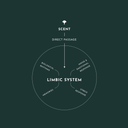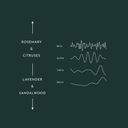
Even though it is, by far, our most sophisticated sense


- New York Times -
A mysterious yet elegant neurological process that colours our lives and shapes our experiences, each and every day.
That’s because unlike other senses, the olfactory system has a direct connection to the limbic system, the oldest area of the human brain, where emotions and memories are formed.
It's why a particular scent can profoundly affect your mood, evoking powerful emotions and memories, a phenomenon known as The Proust Effect.



Simply by inhalation, volatile aromatic compounds in essential oils travel to the brain via the olfactory nerve, triggering neural activity.

Chemical constituents found in oils, such as bergamot, bind to GABA (Gamma-aminobutyric acid) receptors, promoting relaxation and reducing anxiety.
Electroencephalograms (EEGs) tests have also shown that essential oils alter brain wave activity.
Lavender and sandalwood, for example, stimulate theta and delta waves, which are associated with a more relaxed state, while rosemary or citruses like bergamot and pink grapefruit elevate beta waves, linked with alertness and focus.
You've heard of aromatherapy, but at Appellation we are guided by aromachology, using scent to stimulate or soothe the senses and enhance emotional wellbeing.



These naturally occurring chemicals have been extensively studied, and are known to enhance cognitive function, sharpen memory and improve mental clarity.

These constituents stimulate the release of dopamine and serotonin, which turn down the dial on your body's fight-or-flight response, slowing the heart and the breath, and calming the body and mind.


Aromachology is a natural and effective intervention to modern-day malaise. A tool to leverage to enhance the quality of our lives. A simple, low-cost way to feel better, naturally.
Less stressed out, overwhelmed and fatigued. More calm, balanced and restored. Put simply, a better version of you.